
The Football Association Challenge Cup, more commonly known as the FA Cup, is an annual knockout football competition in domestic English football. First played during the 1871–72 season, it is the oldest national football competition in the world. It is organised by and named after The Football Association. Since 2015, it has been known as Emirates FA Cup after its headline sponsor Emirates. A concurrent Women's FA Cup has been held since 1970.

The original Wembley Stadium was a football stadium in Wembley, London, best known for hosting important football matches. It stood on the same site now occupied by its successor and by its predecessor, Watkin's Tower.

Bolton Wanderers Football Club is a professional association football club based in Horwich, Greater Manchester, England. The team competes in League One, the third level of the English football league system.
Joseph Lloyd Carr, who called himself "Jim" or "James", was an English novelist, publisher, teacher and eccentric.

The Football Association Challenge Trophy, commonly known as the FA Trophy, is a men's football knockout cup competition run by and named after the English Football Association and competed for primarily by semi-professional teams. The competition was instigated in 1969 to cater to those non-league clubs that paid their players and were therefore not eligible to enter the FA Amateur Cup.
A steeple is a tall tower on a building, often topped by a spire.
Wanderers Football Club was an English association football club. It was founded as "Forest Football Club" in 1859 in Leytonstone. In 1864, it changed its name to "Wanderers", a reference to it never having a home stadium, instead playing at various locations in London and the surrounding area. Comprising mainly former pupils of the leading English public schools, Wanderers was one of the dominant teams in the early years of organised football and won the inaugural Football Association Challenge Cup in 1872. The club won the competition five times in total, including three in succession from 1876 to 1878, a feat which has been repeated only once.
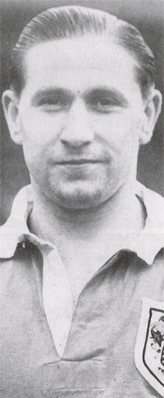
Stanley Harding Mortensen was an English professional footballer, notable for his part in the 1953 FA Cup final, in which he became the only player ever to score a hat-trick in a Wembley FA Cup Final. He was also both the first player to score for England in a FIFA World Cup qualifying campaign and the first England player to score in the tournament proper.
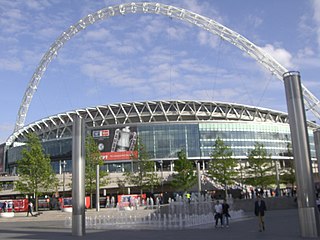
The FA Cup Final is the last match in the Football Association Challenge Cup. It has regularly been one of the most attended domestic football events in the world, with an official attendance of 89,472 at the 2017 final. The Final is the culmination of a knockout competition among clubs belonging to The Football Association in England, although Scottish and Irish teams competed in the early years and Welsh teams regularly compete, with Cardiff City winning the Cup in 1927 and reaching the final in 1925 and 2008. From 1923 until 2000 it was played mostly at the original Wembley Stadium, and has been played at the current Wembley Stadium since 2007.
The 1978–79 season was the 99th season of competitive football in England.
James McCalliog is a Scottish former football player and coach. He played in the Football League for Chelsea, Sheffield Wednesday, Wolverhampton Wanderers, Manchester United, Southampton and Lincoln City, as well as in the United States with Chicago Sting and in Norway with Lyn.
The Quince Tree Press is the imprint established in 1966 by J. L. Carr to publish his maps, pocket books and novels. The Press is now run by his son Robert Carr and his wife, Jane.

The Harpole Report is the third novel by J. L. Carr, published in 1972. The novel tells the story mostly in the form of a school logbook kept by George Harpole, temporary Head Teacher of the Church of England primary school of "Tampling St. Nicholas". The novel has attained a minor cult status within the teaching profession. The characters George Harpole and Emma Foxberrow reappear in Carr's eighth and final novel, Harpole & Foxberrow General Publishers and more briefly, What Hetty Did.
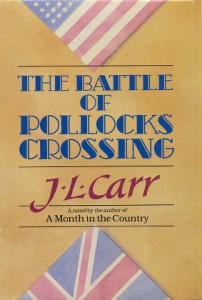
The Battle of Pollocks Crossing is the sixth novel by J.L. Carr, published in 1985. The novel was shortlisted for the Booker Prize in 1985 and followed a nomination in 1980 for A Month in the Country, his preceding novel.

A Day in Summer is the first novel by J. L. Carr, published in 1963. It is the story of an RAF veteran named Peplow who arrives in the fictional village of Great Minden on the day of its annual Feast, seeking retribution for the death of his son.
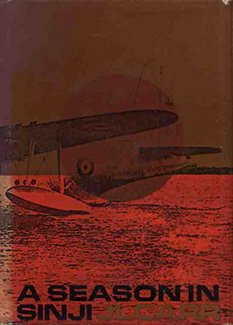
A Season in Sinji is the second novel by J. L. Carr, published in 1967. The novel is set mostly at fictional RAF Sinji in west Africa during the Second World War and features a bizarre cricket match.
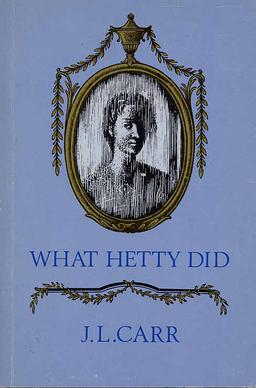
What Hetty Did is the seventh novel by J. L. Carr, published in 1988 when he was 76 years old. The novel describes the experiences of an 18-year-old girl. Hetty Birtwisle has been brought up by adoptive parents in the Fens; after a beating by her father, discovering that she was adopted, she flees to Birmingham where she has learnt she was born and alters her surname to Beauchamp.

Harpole & Foxberrow General Publishers is the eighth and last novel by J.L. Carr, published in 1992, just after his 80th birthday. The narrator of the story is Hetty Beauchamp, the heroine of What Hetty Did, who describes how George Harpole and Emma Foxberrow returned from working at a teacher-training college in Sinji, the setting of A Season in Sinji, to establish a small provincial publishing firm.
The 1928–29 FA Cup was the 54th season of the world's oldest football cup competition, the Football Association Challenge Cup, commonly known as the FA Cup. Bolton Wanderers won the competition for the third time, beating Portsmouth 2–0 in the final at Wembley.












